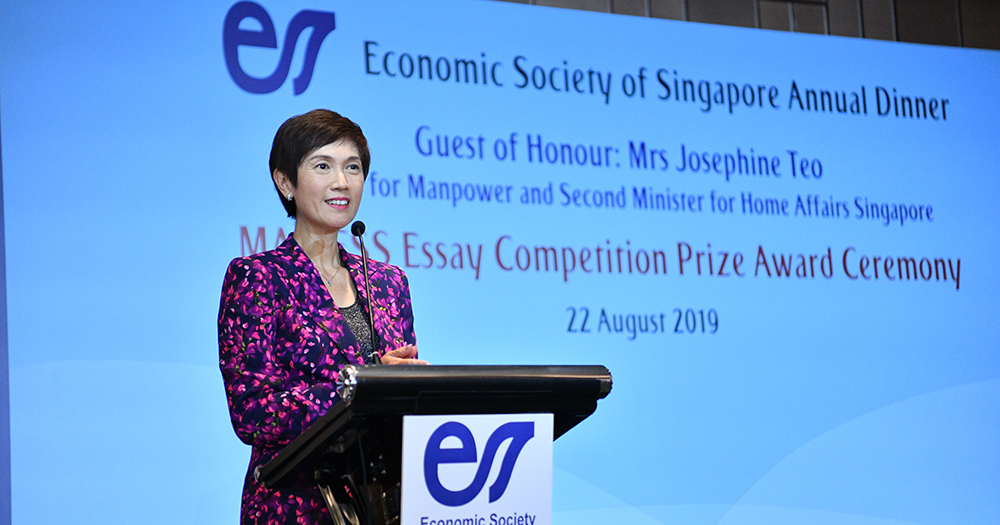"Our approach is a practical one -- never say never," Minister for Manpower Josephine Teo said when asked about having universal basic income in Singapore.
Teo's reply came as part of a wider question-and-answer session held with economists and students, at the annual dinner of the Economic Society of Singapore on Aug. 22, at the Mandarin Orchard Singapore.
Besides universal basic income, Teo also answered questions raised on Singapore's low fertility rate and climate change.
Universal basic income not entirely out of the question
Teo said the Singapore government was not writing off the concept of universal basic income entirely.
The concept of universal basic income is gaining traction in the United States as a result of its advocacy by Democratic presidential candidate Andrew Yang.
To the amusement of the crowd, Teo added: "Some things we'd never thought we'd do for a long time -- we said we would always work on Saturdays, right? We got rid of it too, and still we're working 24/7."
Teo had been asked by Professor Euston Quah, President of the Economic Society of Singapore, about whether the government will consider the universal basic income idea, in the face of technological disruption and the displacement of human labour by machines.
Quah also made reference to Switzerland leading discussions on the matter, with an experiment that saw around 600 people sign up for a year-long universal basic income experiment in September 2018.
Switzerland had overwhelmingly voted against a universal basic income plan, in 2016, by 77 percent.
Teo referenced Finland and noted that the country had implemented a universal basic income, only to scale it back after a period of time.
For nearly two years, from January 2017 to December 2018, Finland ran a trial that saw 2,000 unemployed Finns receive a monthly flat payment of €560 (S$860), the BBC reported.
The outcome of the trial found that while a universal basic income did not help the unemployed find work, it made them happier.
Teo said it is possible for the concept to perhaps re-emerge in another form that is more practical and does not create "moral hazards".
Dealing with Singapore's low fertility rate
In response to a question on how to deal with Singapore’s low fertility rate, Teo framed the issue as a matter of perspective.
The minister suggested to understand population development as a long-term plan, to look at it in decades than from an annual basis, and to observe it in five-year chunks.
She conceded that with each generation, there is a decreasing number of births.
However, she said she remains hopeful that there might be a surge in birth rates in the coming years, when the "echo boomers" (millennials) come of age.
She believes that it “hasn’t happened yet”, as people are choosing to marry and start families later, although they may face biological challenges in that aspect.
Teo also elaborated that the government’s role in the population issue is to work as a facilitator, by providing an environment that can “help people shape their personal decisions”.
She pointed out that Singapore’s public housing was a big plus “compared to many other cities” in facilitating population development, but what could be done meanwhile is to “build up early childhood education much more quickly”.
Teo said: "If you look at the developments on preschool in the last couple of years, it’s very encouraging. I think there are a lot more places. Can we do more? The answer is, yes."
Population goals are "not in conflict" with climate change goals
Teo's response to the subsequent question on how population goals could be reconciled with climate change goals elicited laughter from the audience.
Teo said: "The two are not in conflict -- we are a very small population in the whole world."
She added that the aim was to reduce the carbon footprint of Singaporeans and that the government took the country's commitments to the Paris Agreement very seriously.
Additionally, it was important to note the manner in which Singapore had considered sustainability as integral to the country's development.
Teo said: "Even from a long time ago, even very early in our independence, we already thought about how you keep the city green, as a way of providing comfort, and how do you conserve water and how do you make sure you conserve energy?"
"I think we are quite fortunate that these things are not so distant from us."
However, Teo added that one aspect with room for improvement was the waste generated from personal consumption.
She said: "Just because we have more people, doesn't necessarily mean we have to use a lot more resources."
"We can be cleverer, smarter and more responsible about it and I don't feel that the two (population goals and climate change goals) are always in conflict."
Top photo from MOM
If you like what you read, follow us on Facebook, Instagram, Twitter and Telegram to get the latest updates.
